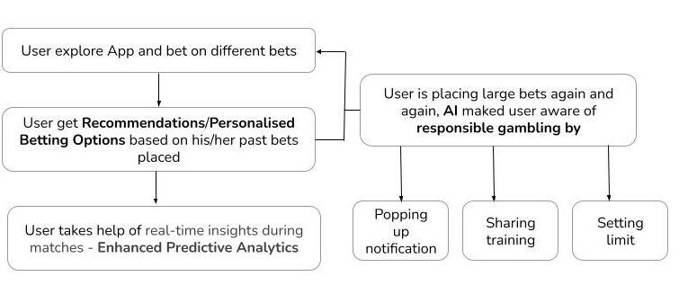Role of AI in Wagering

Role of AI in Wagering
Introduction
From revolutionising industries to enhancing everyday experiences, Artificial Intelligence (AI) continues to shape the way we live, work, and interact with the world around us. With its ability to analyze vast amounts of data, learn from patterns, and make intelligent decisions, AI is unlocking new possibilities across diverse domains. Whether it’s optimizing business processes, personalising customer experiences, or driving scientific breakthroughs, AI holds the potential to transform virtually every aspect of human endeavor. As we harness the power of AI, we embark on a journey toward a future where technology empowers us to achieve greater heights and realize our full potential.
Another evolving industry, WAGERING (commonly associated with gambling and involves placing bets on sports events, casino games, horse racing, or other forms of competitive activities where the outcome is uncertain), where decisions carry significant stakes, AI plays a pivotal role. It spans from predictive analytics to improving user experience, improving security measures, streamlining operations, and advocating responsible gambling practices. Let’s explore how AI is transforming this sector and the implications it entails.
Promoting Responsible Gambling
The responsibility of promoting ethical practices, particularly in the context of responsible gambling. AI can analyse through several key mechanisms:
- Early Detection of Problematic Behavior AI algorithms can analyze vast amounts of data generated by players, such as betting patterns, frequency of play, and financial transactions. By identifying irregularities, such as frequent large bets, types of games played, and session durations, AI can flag potential problem gamblers before their behavior becomes harmful.
- Personalized Responsible Gambling Messages AI can also tailor responsible gambling messages to individual players. Instead of generic warnings, AI systems can deliver personalized messages based on a player’s behavior. For example, if a player is betting more frequently or spending more money than usual, the AI system can send a customized message encouraging them to take a break or set limits.
- Risk Assessment and Player Segmentation AI-driven risk assessment tools can segment players based on their risk levels, allowing operators to provide targeted interventions. High-risk players can receive more frequent and robust responsible gambling messages, while low-risk players may receive reminders at appropriate intervals.
- Self-Exclusion and Limit Setting Help to tailor responsible gambling tools based on individual behavior like setting deposit limits, session time reminders, or cooling-off periods, thus fostering a safer environment for all users.
Enhanced Predictive Analytics / Increased Precision in Predictions
- By analyzing large volumes of data from diverse sources such as historical betting trends, player statistics, weather conditions, and more, AI can generate new data points, explore vast possibilities, and uncover hidden patterns. This ability to “think outside the box” dramatically increases the precision of predictions, making AI a game-changer for the gambling industry.
- Provide real-time insights during matches, incorporating live data feeds such as current scores, player performance metrics, and betting market movements. This allows for immediate adjustments in predictions and odds as the game progresses. For instance, if AI predicts a strong likelihood of a particular horse winning based on current data analysis, the odds for that horse may decrease as more bets are placed on it.
- Predictive models to anticipate user preferences and behaviors. By analyzing historical data and real-time interactions, AI can predict which games or bets a user is likely to be interested in, enhancing the relevance of recommendations and offers.
Enhanced Personalization and User Experience
AI will continue to drive personalized user experiences in the wagering industry by
- Personalized Betting Recommendations: Analyze users’ betting history, preferences, and behavior to offer personalized betting suggestions. For instance, by examining past bets, favorite sports, and betting patterns, AI can predict what types of bets a user is likely to be interested in.
- Customized User Interfaces: Personalize the interface of wagering platforms to match individual user preferences, making the experience more intuitive and enjoyable. For instance Tailored Layouts (customizing the layout based on user behavior, such as highlighting preferred sports or types of bets) or Adaptive Design (adjusting the interface in real-time to optimize usability and engagement, such as showing more relevant information during live events)
- Content Personalization: tailoring the information presented to each user based on user’s past interactions and preferences helps in enhancing their overall experience. This information can be related to news feeds and updates relevant to users, betting interests, educational resources to help users improve their betting strategies.
- Improved user experience can be achieved through AI-powered chatbots and recommendation engines that provide users with personalized betting suggestions and guidance.
This level of personalization enhances user engagement and satisfaction, leading to increased retention rates.
Fraud Detection and Prevention
AI systems detect fraudulent activities by monitoring betting patterns and flagging anomalies in real-time. It can identify suspicious behaviors, such as unusual betting volumes or patterns that deviate from the norm, enabling quicker response to potential fraud and contributing to a fairer and more secure betting environment. There are different types of AI techniques used for Fraud Detection and Prevention
- Machine Learning Algorithms
- Real-Time Monitoring and Anomaly Detection
- Natural Language Processing (NLP)
- Network Analysis
By leveraging the above techniques, AI systems can effectively identify and mitigate fraudulent activities. However, challenges related to data quality, regulatory compliance, and ethical considerations must be addressed to maximize the potential of AI in safeguarding the industry.
Use Case: Personalised Betting Recommendation & Risk Management
Background: An online sports betting company aims to enhance user engagement and ensure responsible gambling by leveraging AI.
Objective:
- Provide personalized betting recommendations to users.
- Identify and mitigate problem gambling and fraudulent activities.
Solution:
-
- Data Collection and Analysis:
- The company collects data on users’ betting histories, preferences, demographic information, and real-time betting behavior.
- Additional data like social media trends, current sports news, and historical performance data of teams and players.
- Personalized Betting Recommendations:
- User Profiling: AI algorithms analyze the collected data to create detailed profiles of each user. These profiles include preferred sports, betting patterns, and spending limits.
- Recommendation Engine: A machine learning-based recommendation engine uses these profiles to suggest bets that align with user’s interests and betting history. For example, if a user frequently bets on Premier League football matches, the engine might recommend upcoming matches with favorable odds.
- Dynamic Adjustments: The AI system continuously updates recommendations based on real-time data and changes in user behavior, ensuring relevance and engagement.
- Risk Management:
- Behavioral Analysis: AI models analyze betting patterns to detect unusual or risky behavior. For instance, if a user starts placing significantly larger bets than usual or shows erratic betting behavior, the system flags this activity.
- Problem Gambling Detection: The AI system identifies signs of problem gambling, such frequent bets within a short time, or betting beyond typical limits. Users showing these signs receive alerts and resources for responsible gambling.
- Fraud Detection: AI algorithms monitor for patterns indicating fraud, such as coordinated betting on unlikely outcomes, multiple accounts from the same IP address, or suspiciously timed bets.
- Intervention and Support:
- Automated Alerts: Users flagged for risky behavior or potential problem gambling receive automated alerts, reminders, training on gambling responsibly.
- Personalized Limits: Based on AI insights, the platform can suggest or enforce personalized betting limits to promote responsible gambling.
- Data Collection and Analysis:
Outcome:
- Enhanced User Experience: Personalized recommendations lead to higher user engagement and satisfaction, as users receive suggestions tailored to their interests.
- Reduced Risk: AI-driven risk management helps in early detection of problem gambling and fraud, protecting users and the company.
- Responsible Gambling: Proactive interventions and personalized limits support responsible gambling practices, aligning with regulatory requirements and ethical standards.
Example Scenario: John, an avid sports bettor, primarily bets on basketball and has a history of placing moderate-sized bets. Recently, John’s betting pattern has changed, he started placing large bets on obscure sports and at odd hours.
Situations where AI is assisting in the workflow:
- Integrated with the betting engine by assisting in the prediction and generation of odds that are shown to the user
- Detecting anomalies during login
- Displaying recommendations when John lands on the homepage
The AI system detects this anomaly and flags John’s account. John receives an automated alert advising him to review his betting behavior and offer training for responsible gambling. Simultaneously, the customer support team is notified and reaches out to John to ensure he’s gambling responsibly. Additionally, John’s betting limits are temporarily adjusted to prevent further risky bets.
By implementing this AI-driven solution, the betting company not only enhances user engagement through personalized recommendations but also upholds a commitment to responsible gambling and fraud prevention. The below workflow explains how this can happen.

AI-Driven Flow
In essence, the future of AI in the wagering industry is characterized by innovation, personalization, and responsible integration. As AI technologies continue to advance, they will undoubtedly reshape how betting and gaming platforms operate, cater to users, and ensure sustainable growth in the industry. However, navigating the ethical implications and regulatory landscape will be crucial to harnessing AI’s full potential while safeguarding consumer interests and promoting responsible gambling practices.

